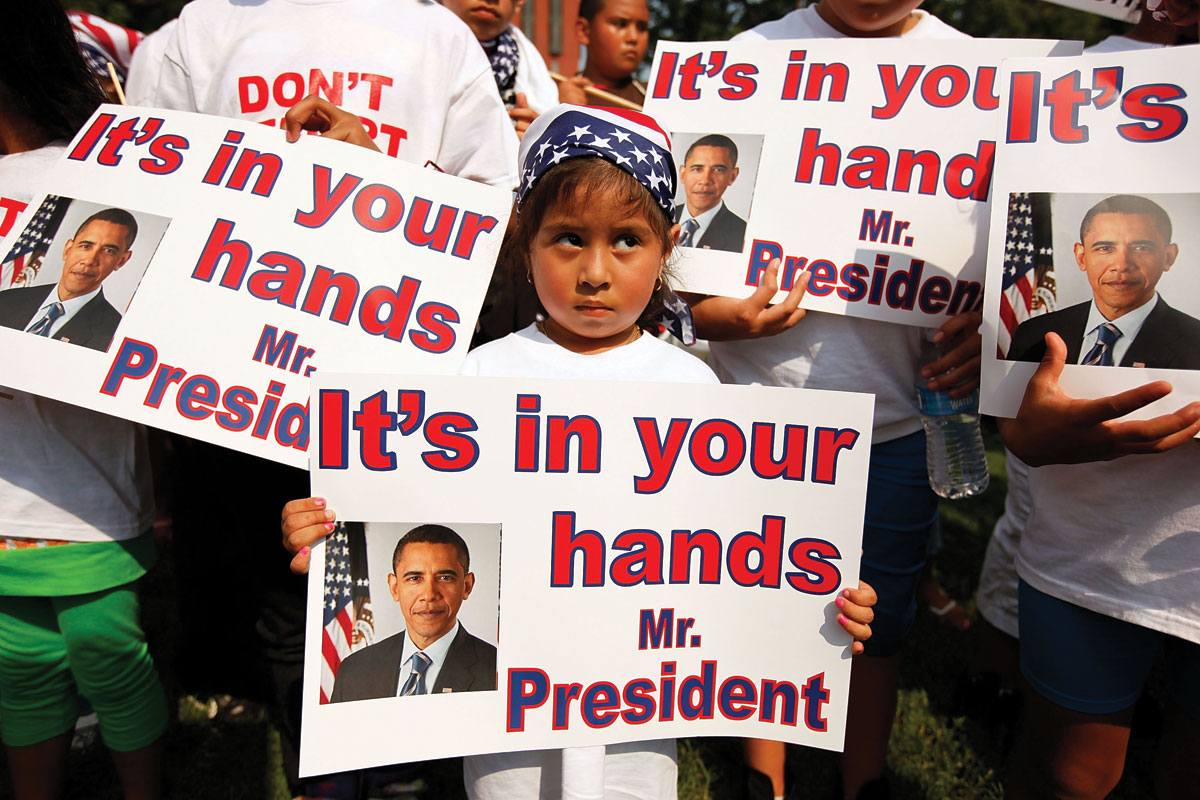THE IMMIGRATION REFORM PLAN
U.S.-born children from across the country traveled to the White House with their undocumented parents to march and demonstrate against deportations, July 28, 2010 in Washington, DC. The marchers describing themselves as “Obama Orphans,” or children whose parents have been deported, called on President Barack Obama to keep his campaign promise of comprehensive immigration reform. (Chip Somodevilla | Getty Images)
[divider type=”thin”]
On Nov. 20, 2014, President Barack Obama announced that he would take executive action to shield millions of undocumented immigrants from deportation. Following his announcement, New America Media hosted a national telephonic press briefing for ethnic media reporters, with speakers Marielena Hincapié of National Immigration Law Center, Marshall Fitz of Center for American Progress and Sally Kinoshita of Immigrant Legal Resource Center. More than 75 reporters from around the country called in to ask questions about the impact it will have on their communities. Here are the answers to some of their most frequently asked questions, writes Elena Shore.
[divider type=”thin”]
Who will benefit from Obama’s executive action?
There are three main groups that will benefit under Obama’s plan: parents of U.S. citizens or Legal Permanent Residents; undocumented immigrants who came to the U.S. before the age of 16; and spouses and children of Legal Permanent Residents.
Parents: If you are a parent of a U.S. citizen or a parent of a Legal Permanent Resident and you have lived in the U.S. continuously since Jan. 1, 2010 and can pass a background check, you may be eligible to apply for Deferred Action for Parental Accountability (DAPA) and a work permit. The program should be up and running by May 20, 2015.
Those who arrived before age 16: Obama is removing the age cap from Deferred Action for Childhood Arrivals (DACA), so if you were too old to qualify before, you may be able to qualify under the new DACA if you came to the U.S. before the age of 16, and have continuously lived in the U.S. since Jan. 1, 2010. The DACA expansion is likely to go into effect Jan. 20, 2014.
Spouses and Children: Obama’s new program will allow spouses and children of Legal Permanent Residents to apply for a waiver so they can get a green card sooner. Under current law, undocumented immigrants must leave the U.S. to get a green card, which may trigger a three-year or 10-year bar that prevents them from entering the U.S. for that amount of time. They will now be able to apply from within the U.S.
How do I avoid being scammed?
Be wary of anyone who says they can help you for a fee, before the new programs go into effect. There is nothing to apply for now, except for the current DACA program that was announced in 2012. The new DACA expansion that Obama announced is likely to go into effect Jan. 20, 2014 and the new deferred action program for parents is expected to go into effect May 20, 2014. So there is no reason to start paying anyone for immigration services now, especially if they promise to get you to the front of the line, to receive extra benefits, or anything else that sounds too good to be true.

How much will it cost?
The application fee will be $465. However, you can inquire about microloan programs and other means of help for low-income families.
If I am granted deferred action, how long will it last?
This is a temporary program that will protect you from deportation for three years and it is renewable.
Why is this program temporary?
Executive action is by its nature temporary. An act of Congress would be needed to create a more permanent solution.
Can I travel abroad under deferred action?
Yes, but only if you apply for and are granted something called “advance parole,” which gives you the authority to travel without being concerned about being stopped at a U.S. port of entry.
Will I be able to get a Social Security number?
Yes. When you get your work permit, go to your local Social Security office to apply for your number. You can look up your local Social Security office at www.ssa.gov.
Will the Central American youth who came here this summer benefit from executive action?
No. To qualify for the expanded DACA program, you have to have lived in the U.S. continuously since Jan. 1, 2010.
Will the expansion include LGBT parents?
Yes, but additional guidance is needed to make sure this program is accessible to all LGBT parents. For example, it is unknown how this will affect couples who live in one of the 35 states where there are no explicit protections for same-sex couples to petition for second-parent adoptions.
Will this include adopted parents and stepparents?
Yes, parents with adopted children and stepchildren count, but only if the parents were married before the stepchild was 18, or if the child was adopted before the age of 16 and has lived with the parent for two years.
How do I know if it’s safe to come forward?
With DACA, the administration included certain confidentiality provisions that are a kind of firewall between USCIS and ICE. That same firewall will also be included in this program.
What happens after three years?
There is no guarantee, but the more people that come forward and apply and receive deferred action, the harder it will be for a future administration to rescind this program.
Where can I go for more information?
Stay tuned to USCIS.gov for the latest information: http://www.uscis.gov/immigrationaction.


